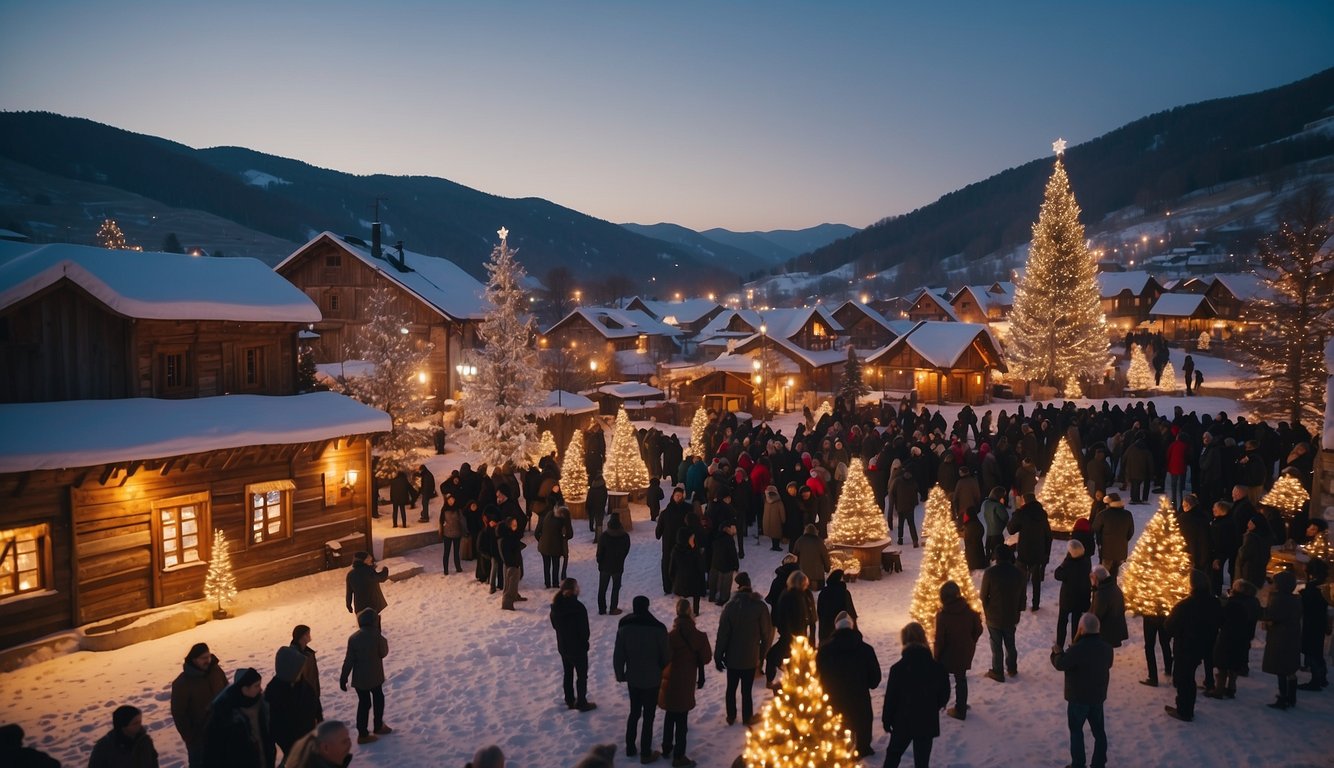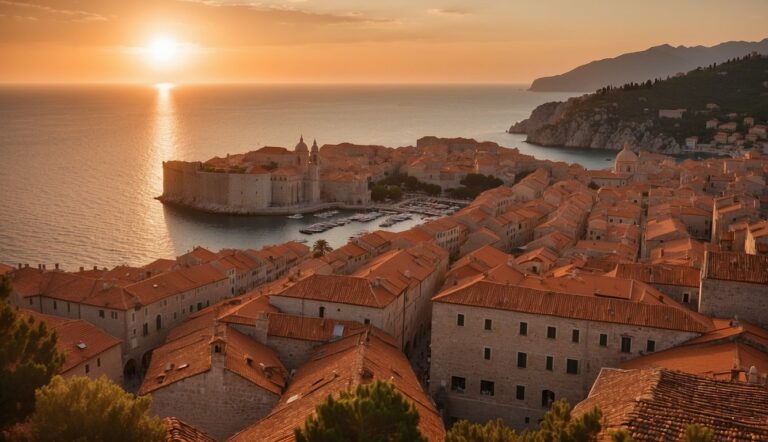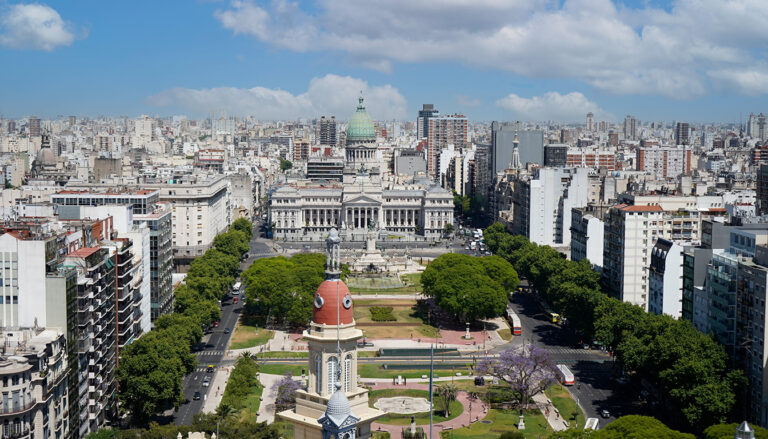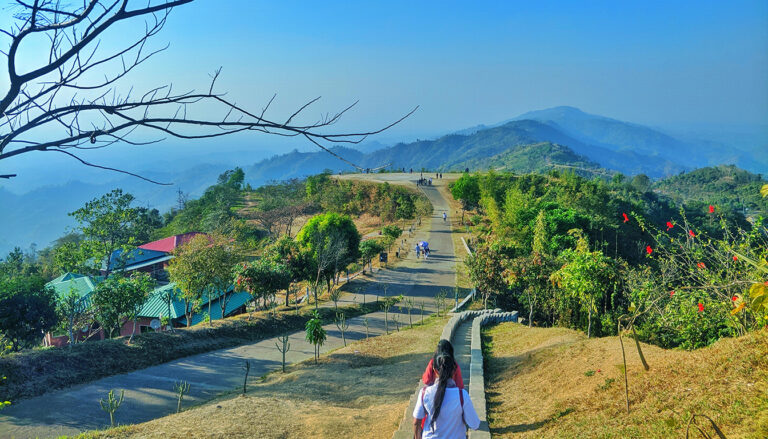Exploring Bulgarian Christmas Traditions: Celebrate Christmas in Bulgaria
Christmas in Bulgaria presents a blend of traditional Christian practices and unique local customs, offering a fascinating perspective on festive celebrations. Although Bulgaria is an Eastern Orthodox country where some religious observances align with the Julian calendar, Christmas is celebrated on December 25th, in line with the Gregorian calendar commonly used for secular dates. This synchrony with Western customs allows for a holiday season that is familiar to international visitors and rich with Bulgarian heritage.
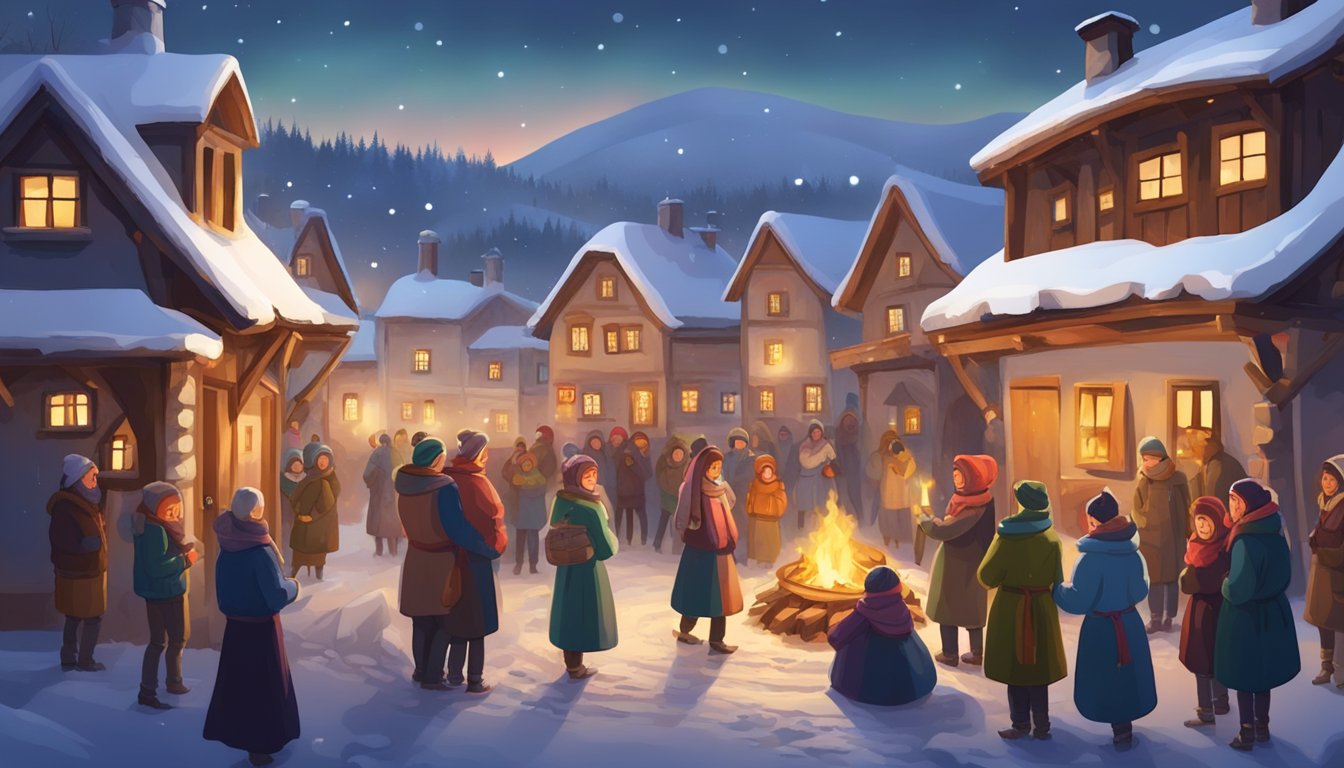
The holiday’s preparations begin long before the 25th, embodying a spirit of community and familial warmth. Christmas Eve in Bulgaria is particularly significant, marked by an elaborate dinner that consists of an odd number of vegetarian dishes, symbolizing the various phases of life and the cycles of nature. The meal is a central part of the celebration, bringing families together to share in traditions passed down through generations.
Intriguingly, carolling is a practice that plays an integral role in the festive period, with groups of ‘koledari’ – carolers – visiting homes in their communities to sing and bring good cheer. These traditions, combined with the decoration of homes with festive lights and Christmas trees, complete the Bulgarian Christmas experience, creating a holiday atmosphere steeped in rich tradition and communal joy.
Origins and Significance of Christmas in Bulgaria
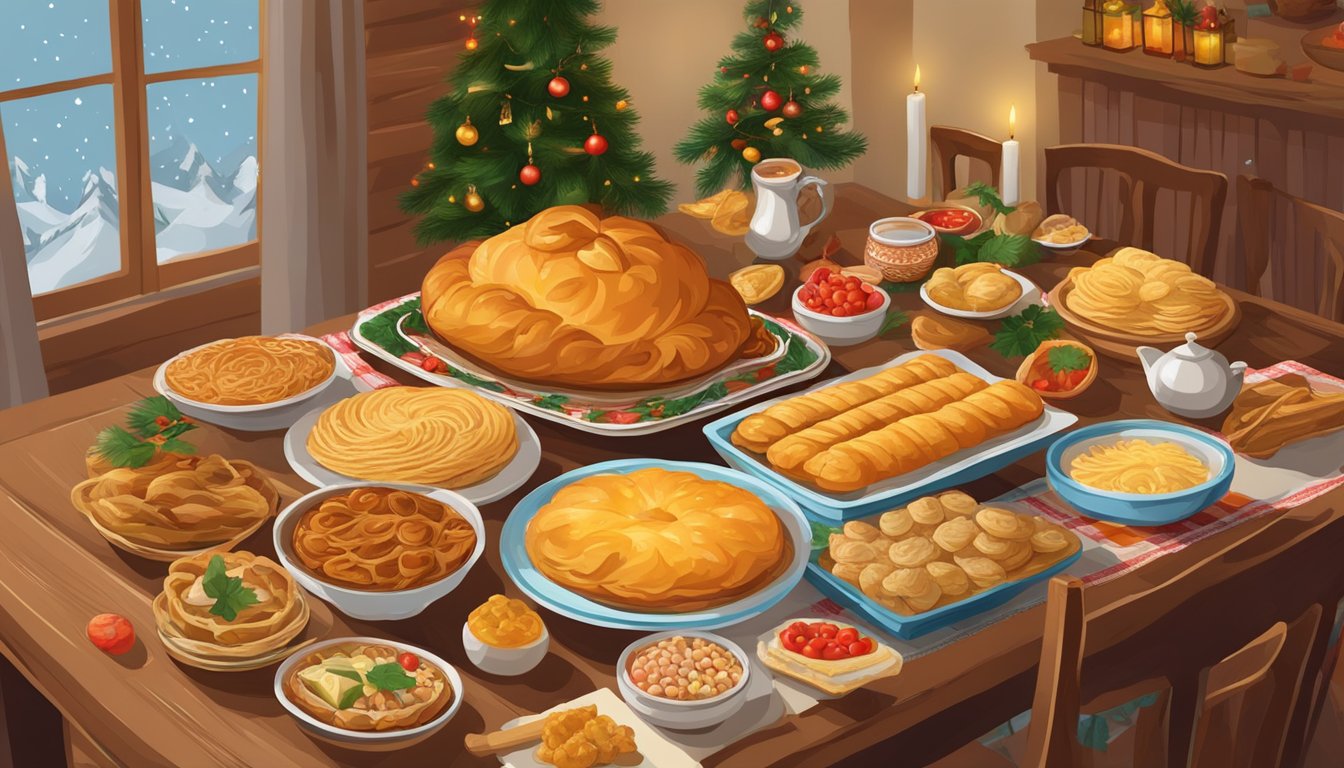
The traditions of Christmas in Bulgaria are deeply rooted in the country’s Orthodox Christian faith, influenced by the Gregorian and Julian calendars. They are marked with unique customs starting from the Day of Saint Ignazhden leading up to the birth of Christ.
Advent and the Orthodox Church
Advent in the Bulgarian Orthodox Church is a time of fasting and preparation for the Nativity of Christ. It begins 40 days before Christmas and is a period of reflection and spiritual anticipation for the coming of Jesus.
Gregorian and Julian Calendars
Bulgaria follows the Gregorian calendar, with Christmas celebrated on December 25th. However, some Orthodox Christians in Bulgaria observe religious feasts according to the Julian calendar, which places Christmas on January 7th. This dual observance is a unique aspect of Bulgarian Christmas traditions.
Day of Saint Ignazhden
The Christmas season officially begins in Bulgaria on December 20th with the Day of Saint Ignazhden, commemorating St. Ignatius of Antioch. This day signals the start of preparations for Christmas, intertwining pagan customs with Christian beliefs, and marks the day when, according to legend, the Virgin Mary’s labour began.
The Birth of Christ and Virgin Mary
The centrepiece of Bulgarian Christmas is the celebration of the birth of Christ. The Virgin Mary, revered as the Mother of Jesus, holds a special place during this festive season. The narrative in Bulgaria encompasses a belief that Mary’s labour lasted from December 20th until the Nativity of Jesus on Christmas Eve, with the official announcement of his birth on Christmas Day.
Bulgarian Christmas Traditions
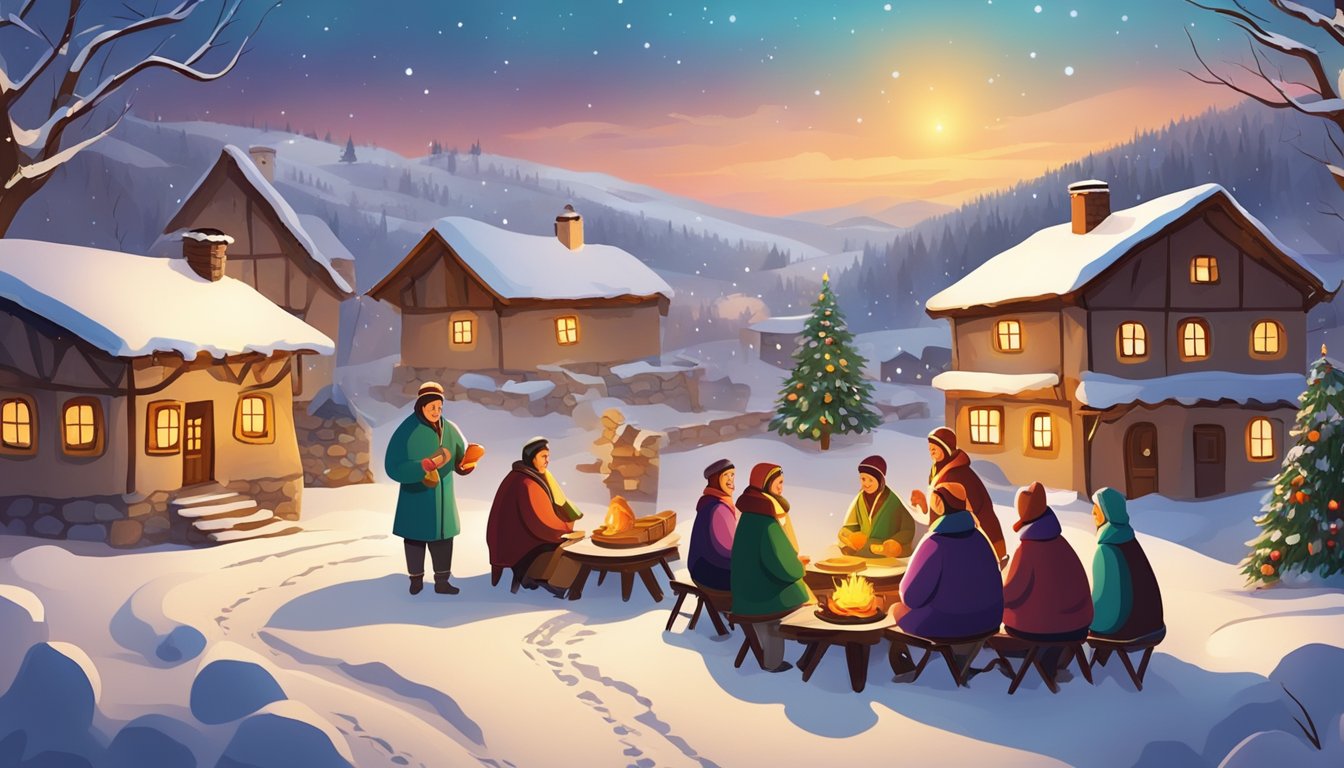
Bulgarian Christmas traditions are a rich tapestry of customs and rituals deeply rooted in the country’s culture and history. They reflect a blend of Christian beliefs and pre-Christian winter solstice celebrations, distinctly observed with a series of festive events, each carrying its significance.
The Koledari
The Koledari are groups of young, unmarried men who engage in a special carolling tradition. Dressed in traditional costumes, they visit local homes on Christmas Eve, singing carols and blessing the household. This ancient practice is believed to bring good fortune and protect families from evil spirits.
Christmas Eve and Badni Vecher
On Christmas Eve, known as Badni Vecher, families gather to enjoy a meat-free feast, often including an odd number of dishes to symbolize abundance. A vital meal element is the ritual bread or Bogovitsa, symbolizing health and prosperity for the upcoming year. This bread is traditionally prepared by a woman in complete silence before dawn. The night is filled with anticipation, as children often look for the first star in the evening sky to commence the dinner, honouring the Star of Bethlehem.
Christmas Day Rituals
On Christmas Day, Bulgarians celebrate with various customs emphasising family togetherness and happiness. One notable tradition involves the family’s youngest child breaking the ritual bread from Christmas Eve and sharing it with each member. This act represents the distribution of light and well-being through the family.
Festive Decorations
The decorations in Bulgaria are characterized by their simplicity and the use of natural elements. The Yule log, known as Badnik or Budnik, is essential to the Bulgarian Christmas. This log is ceremoniously placed on the hearth fire on Christmas Eve to keep the flame alive, symbolizing warmth and light. Homes are also adorned with Christmas trees, decorated with ornaments and lights, reflecting the festive spirit throughout the household.
Culinary Delights of Christmas
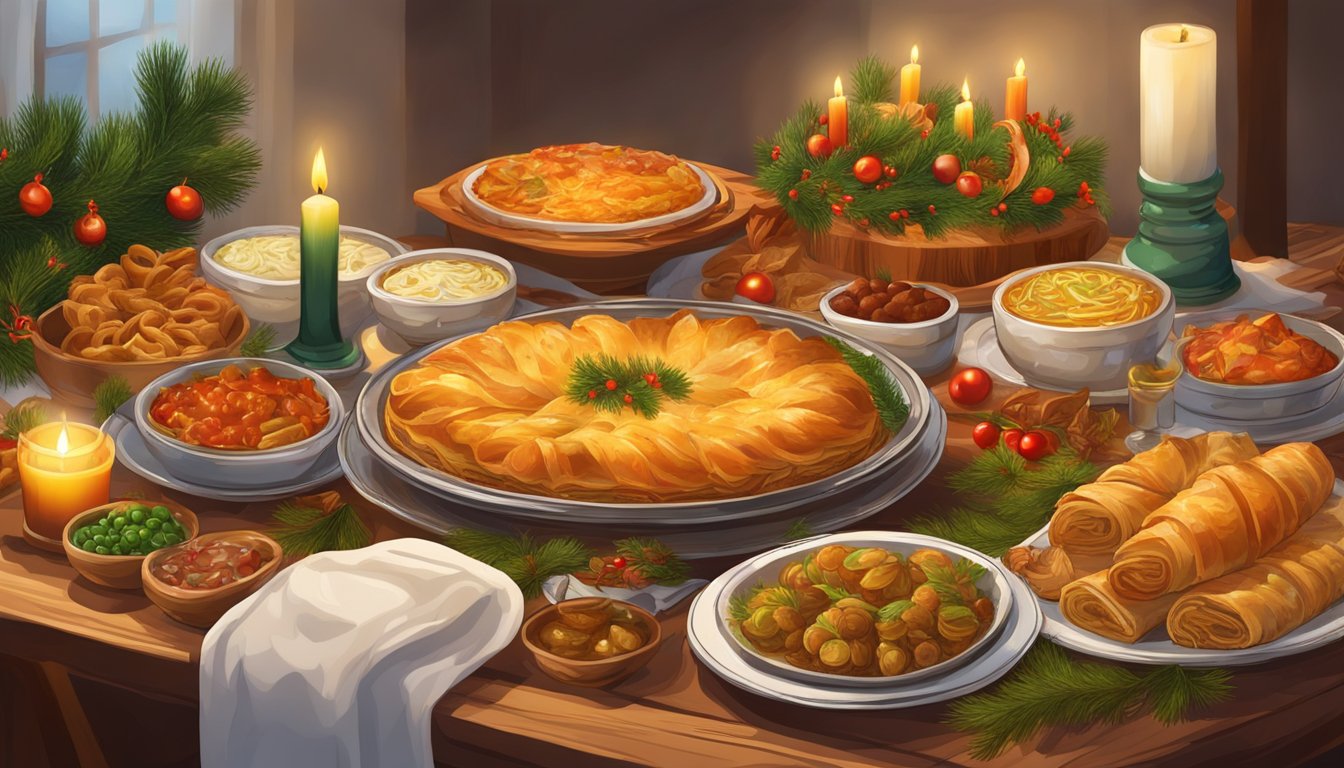
In Bulgaria, Christmas time is marked by an array of culinary traditions which feature both fasting and feasting, emphasising dishes that are not only delicious but also symbolic.
Traditional Christmas Eve Dinner
On Christmas Eve, Bulgarian families honour age-old customs by preparing a vegetarian meal with an odd number of dishes, emphasizing purity and abundance. This meal is typically made up of at least seven items and could include dishes such as:
- Stuffed peppers: Often filled with a mix of rice and beans.
- Sarmi: Cabbage leaves stuffed with rice that may contain nuts like walnuts.
- Bean soup: A staple for warmth and comfort during the winter season.
- Banitsa: A Bulgarian pita layered with various fillings like spinach or leeks; on Christmas, it might include lucky charms for the new year.
Christmas Day Feasting
After the modest Christmas Eve dinner, Christmas Day is a time for feasting. While some traditions remain, such as the inclusion of an odd number of dishes, the day’s meals are more decadent, with foods like:
- Pork: Often the centrepiece of the Christmas meal.
- Cheese: A favourite in various forms, whether in banitsa or as a side dish.
- Fruits and nuts: Symbolizing health and prosperity for the coming year, fruits like oranges and grapes, along with nuts, are common.
Symbolic Foods and Their Meanings
Bulgarian Christmas foods are deeply symbolic, and many believe consuming these foods will bring health and happiness in the coming year. Here are a few standout examples:
- Honey: Tied to well-being, it is enjoyed for its natural sweetness and health benefits.
- Wine: Integral to the celebration, symbolizing joy and festivity; often homemade.
- Oshav: A traditional fruit compote made from dried fruits, like apples or plums, typically sweetened with honey.
Each dish serves as a reminder of the country’s rich cultural tapestry and the spirit of the Christmas season.
Christmas Symbols and Superstitions
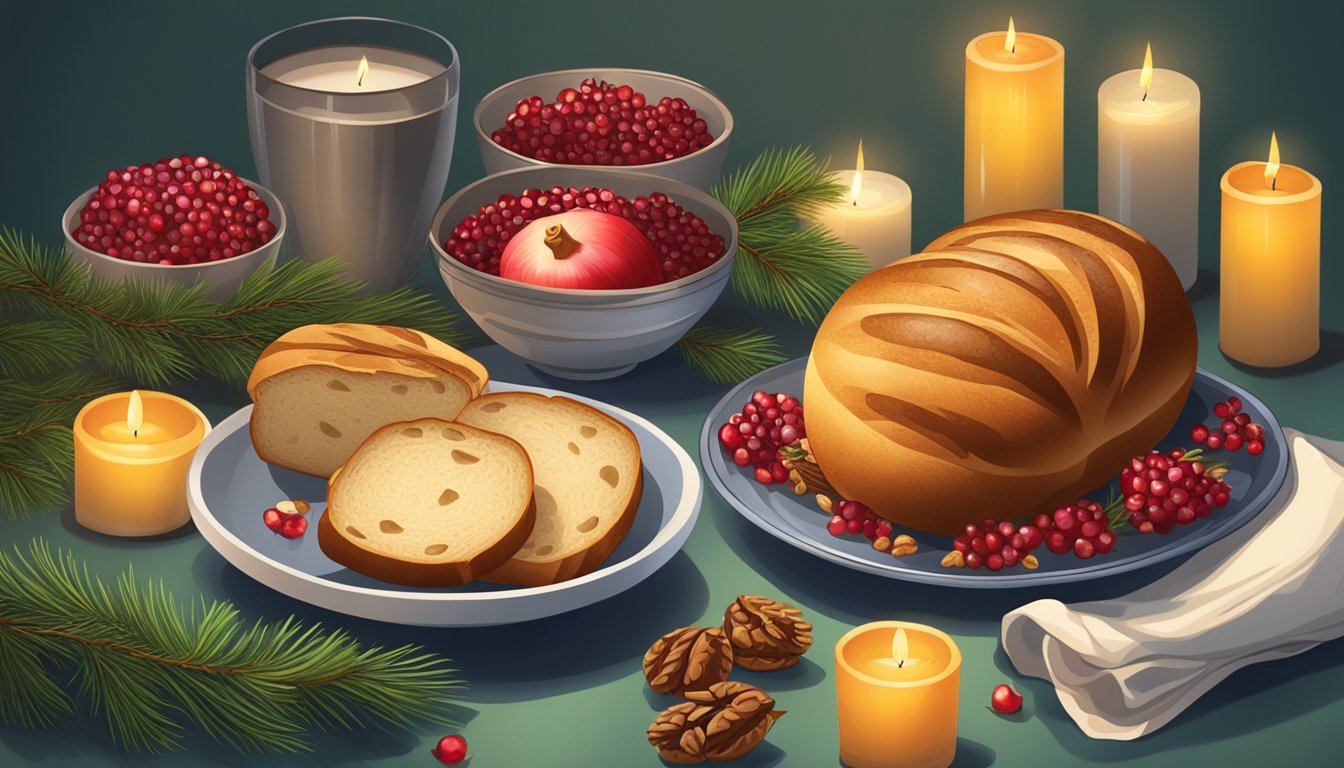
In Bulgaria, Christmas is an occasion rich with symbols and superstitions that intertwine fortune, health, and love with age-old customs. These traditions are deeply embedded in the festive celebrations, offering a glimpse into the cultural significance of the holiday.
Fortune-Telling and Omens
Bulgarians engage in various forms of fortune-telling and interpreting omens to predict the fortunes of the coming year. One method involves observing the first visitor on Christmas Day. If the visitor is a man, it symbolizes good luck, whereas a woman might suggest the opposite. Trees also play a role; it is believed that if an oak or elm log burns steadily in the hearth, the family will experience abundance and health. Similarly, young women might place a dogwood twig in water on December 24; if it blooms by New Year’s Day, it foretells a year filled with love and happiness.
The Coin in the Bread
A central tradition is baking a coin inside a loaf of bread, known as pogacha. On Christmas Eve, families gather to break the bread. The person who finds the coin in their piece is said to receive a boon of wealth and good fortune for the upcoming year. Rich in symbolism, the bread itself represents the body of Christ, making this ritual a blend of prosperity, hope and religious reverence.
Protective Rituals
Protection from evil spirits is a crucial concern during Christmas time in Bulgaria. Rituals are performed to safeguard the home and its inhabitants. Carolers, often called koledari, are welcomed into homes as they are thought to bring happiness and keep malevolent forces at bay. Singing and spreading good cheer, they are treated with great respect and provided food and drink for their blessings. Elaborate patterns, sometimes crafted from ashes and incense, might ward off spirits and ensure the household’s safety and well-being for the upcoming year.
Modern Christmas Celebrations
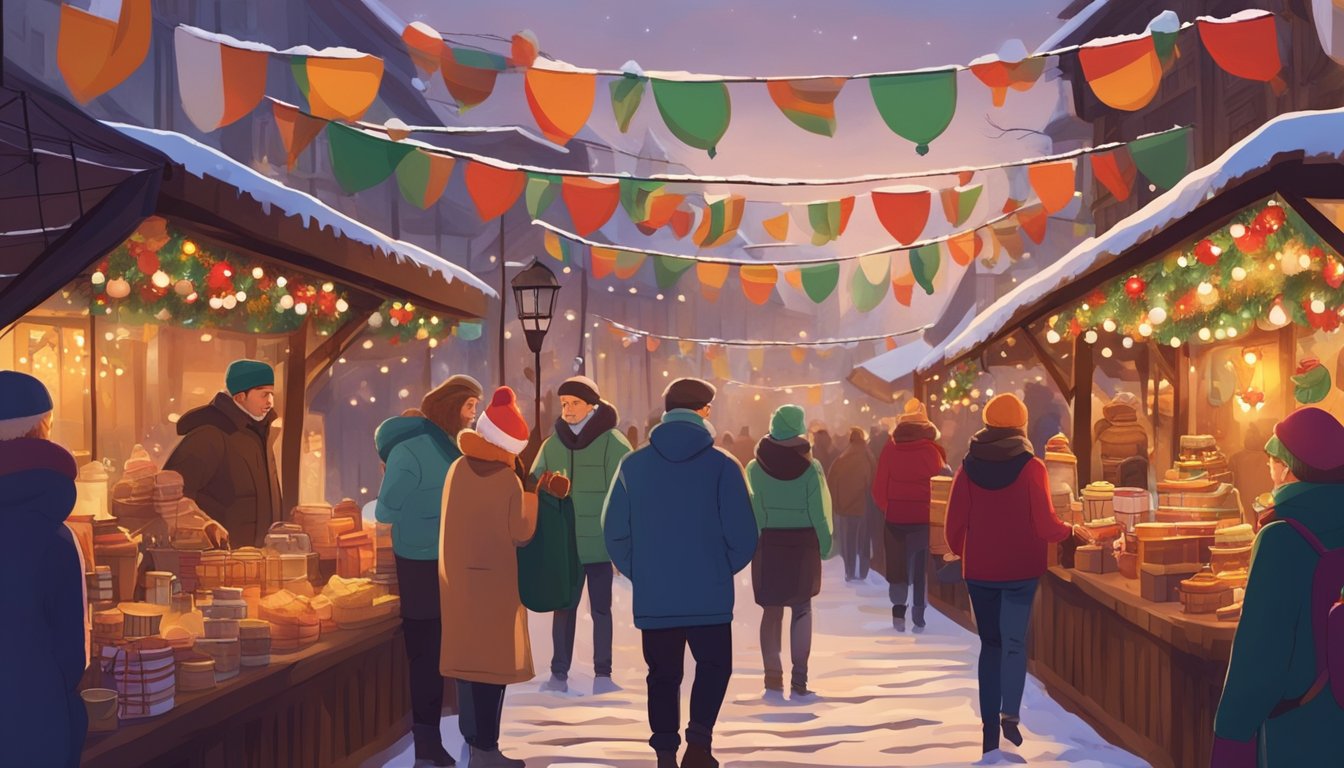
In Bulgaria, Christmas is a blend of age-old customs and contemporary festivities, marked notably by bustling Christmas markets and fairs, cherished family traditions of gatherings and gift-giving, and a combination of public and religious events that observe the holiday spirit.
Christmas Markets and Fairs
Sofia, the capital city, comes to life in winter with the Sofia Christmas Market, where locals and tourists can immerse themselves in the jovial atmosphere. Wooden stalls showcase a variety of handcrafted goods perfect for Christmas presents, from ornaments to knitwear. The air is filled with the aroma of mulled wine and traditional Bulgarian sweets, providing a feast for the senses.
- Location: Sofia’s City Garden and other central spots.
- Dates: Typically from early December through Christmas.
- Highlights:
- Variety of handcrafted gifts.
- Traditional food and drink, such as banitsa and sarmi.
Family Gatherings and Gift Giving
On Christmas Eve, Bulgarian families come together for a ceremonial dinner, traditionally meat-free, marking the end of a 40-day fasting period. On December 25th, the feast continues with dishes that often feature pork. Gift giving is a key component, with children eagerly anticipating visits from Dyado Koleda (Grandfather Christmas) or Santa Claus to receive their gifts.
- Activities: Family dinners, exchanging of presents, and singing carols.
- Cultural Note: Dyado Koleda, the Bulgarian Santa, is an integral part of the festivities.
Public and Religious Observances
As an Eastern Orthodox country, Bulgarian celebrations entail attending church services and public events. Carolers, known as koledari, visit homes with traditional chants to spread goodwill. In many areas, live Nativity scenes and public concerts bring communities together in celebration.
- Church Services: Midnight Mass on Christmas Eve and services onDecember 25th.
- Public Celebrations: Caroling by Christmas carolers and community events.
Christmas Folklore and Characters
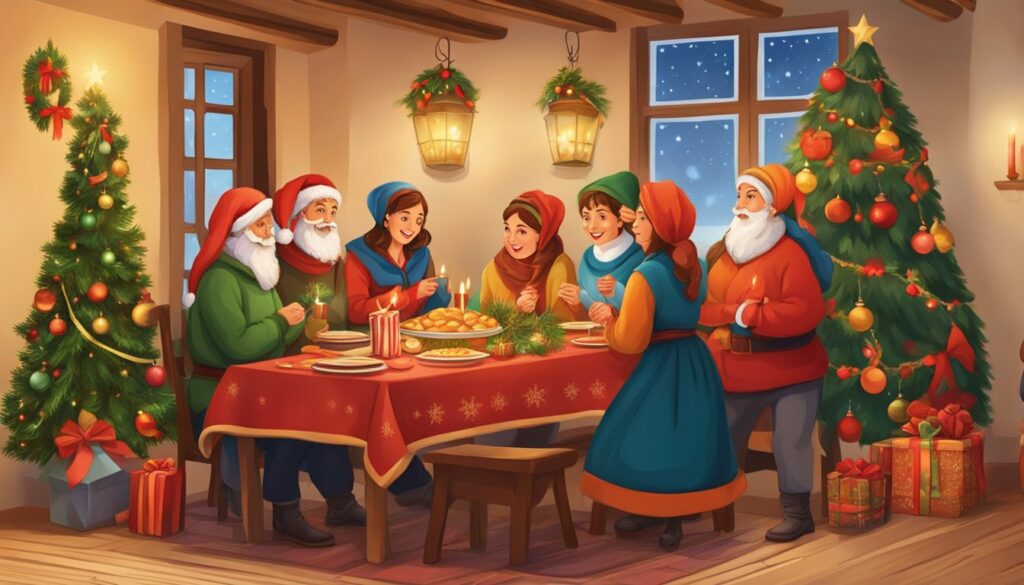
Christmas in Bulgaria is intertwined with ancient folklore and characters, each bringing a unique tradition to the festive celebrations.
Legends of Koleda and Badnik
The concept of Koleda refers to the Bulgarian Christmas, intertwined with legends and customs that date back to pagan times. Badnik, also known as Christmas Eve (Budni Vecher), is a significant part of the folklore. It is believed that magical events occur today, and people engage in rituals to ensure prosperity.
The Traditional Koledari
Koledari are groups of male carolers, often young men, who participate in a custom called Koleduvane. Dressed in traditional costumes that vary by region, they go from house to house starting at midnight on Christmas Eve, singing carols and bringing blessings to families.
Dyado Koleda (Grandfather Christmas)
In Bulgarian folklore, Dyado Koleda, synonymous with Grandfather Christmas, is akin to Santa Claus in Western culture. Instead of the red-clad, jolly Santa, Dyado Koleda is often depicted wearing Bulgarian folk attire and brings joy and gifts to children.

